Related Research Articles
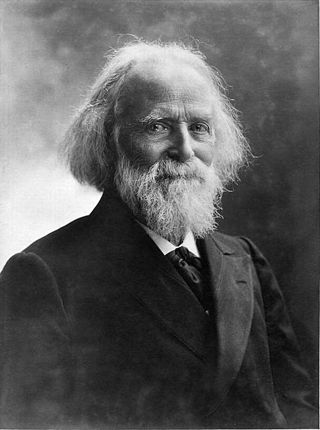
Jacques Élisée Reclus was a French geographer, writer and anarchist. He produced his 19-volume masterwork, La Nouvelle Géographie universelle, la terre et les hommes, over a period of nearly 20 years (1875–1894). In 1892 he was awarded the Gold Medal of the Paris Geographical Society for this work, despite having been banished from France because of his political activism.

Jean Grave was an important activist in the French anarchist and the international anarchist communism movements. He was the editor of three major anarchist periodicals, Le Révolté, La Révolte and Les Temps Nouveaux, and wrote dozens of pamphlets and a number of important anarchist books.
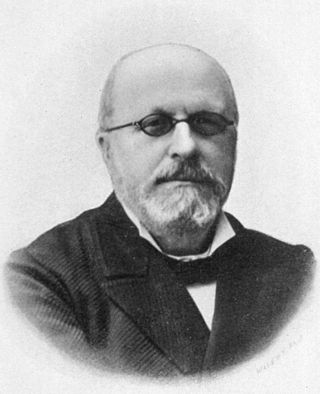
Henri Huchard was a French neurologist and cardiologist.

Abel Hureau de Villeneuve was an aeronautical experimenter, and ran a major French aeronautical society and journal in the late nineteenth century. He was also a vegetarianism activist.
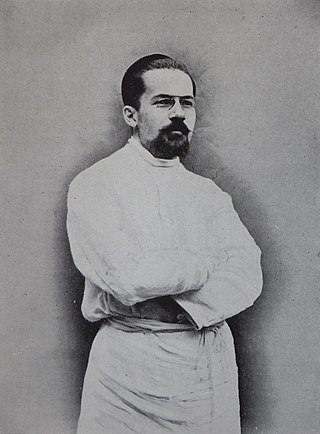
Paul Joseph Edmond Carton was a French physician, naturopath and practitioner of vegetarianism.

Élie Reclus was a French ethnographer and anarchist.

Joseph Favre was a famously skilled Swiss chef who worked in Switzerland, France, Germany, and England. Although he initially only received primary education because of his humble origins, as an adult he attended science and nutrition classes at the University of Geneva, and would eventually publish his four-volume Dictionnaire universel de cuisine pratique, an encyclopedia of culinary science, in 1895.
Naturism has been active in France since 1920.

Gaston Durville (1887-1971) was a French physician who, with his brother, André Durville, was one of the initiators of naturism in France during the interwar period.

André Durville (1896-1979) was a French physician who, with his brother, Gaston Durville, was one of the initiators of naturism in France during the interwar period.

The Reclus family includes the children and extended family of pastor Jacques Reclus (1796–1882) and teacher Zéline Reclus (1805–1887). The Reclus family's notoriety is primarily the result of Jacques and Zéline's five sons: Élie, Élisée, Paul, Armand, and Onésime. The family became known for their distinctive careers in geography, anarchism, journalism, medicine, and other fields during the 19th and 20th centuries.

Ernest Bonnejoy was a French physician and vegetarianism activist.
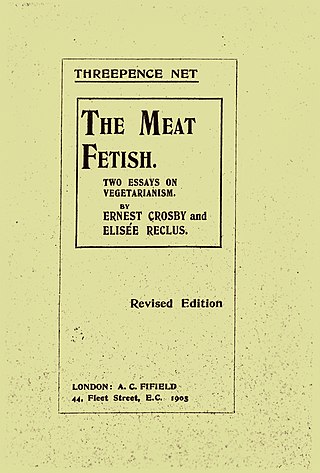
"The Meat Fetish" is a 1904 essay by Ernest Crosby on vegetarianism and animal rights. It was subsequently published as a pamphlet the following year, with an additional essay by Élisée Reclus, entitled The Meat Fetish: Two Essays on Vegetarianism.
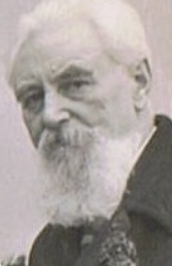
Ernest Nyssens was a Belgian homeopath, naturopath, theosophist and vegetarianism activist.

Renan Larue is a French writer, literary scholar and historian of vegetarianism. He is the author of several books on vegetarianism or veganism, including Le végétarisme et ses ennemis (2015), a history of vegetarianism from Pythagoras until the modern day, and La pensée végane: 50 regards sur la condition animale (2020). In 2016 he offered the first course in vegan studies in the United States at the University of California, Santa Barbara.

Barbare "Varia" Kipiani was the first Georgian trained as a psychophysiologist and is recognized as a pioneering woman scholar of Georgia. Born into a noble family, Kipiani and her sisters were raised by her father after her parents' divorce. After graduating from St. Nino's School in Tbilisi in 1899, she taught in a school in Khoni for two years. Moving to Belgium, where her father had relocated, she entered the medical faculty of the Free University of Brussels in 1902. Unable to afford her tuition, Kipiani was mentored by Polish academic, Józefa Joteyko, who paid her school fees and allowed her to work in a laboratory. She wrote a paper titled "L'ergographie du sucre", which evaluated the use of sugar in alleviating fatigue. Her study won a silver medal from the Association des chimistes de France et des colonies in 1906. After completing her coursework in the medical faculty in 1907, Kipiani lectured at various universities and continued research with Joteyko on nutrition and fatigue. They jointly were awarded the Vernois Prize of the French Académie Nationale de Médecine in 1908 for their work on vegetarianism.

Jacques Colin Frédéric Albert Demarquette, best known as Jacques de Marquette was a French naturist, pacifist, theosophist and vegetarianism activist. He was the founder of Trait d'Union and a naturist camping ground in Choisel. In 1924, Demarquette established the first vegetarian restaurant in Paris.
Jules Grand (1846–1933) was a French physician, writer, Theosophist, and vegetarianism activist. He served as president of the French Vegetarian Society.
Jean-Pierre Édouard Grimard was a French writer, educator, and botanist.
Hélène Goldspiegel-Sosnowska was a Polish-French physician, activist, and writer. She was an eminent gynaecologist and published a number of texts on the subject. Sosnowska advocated for temperance and vegetarianism, serving as vice-president and later president of the French Vegetarian Society.
References
- ↑ "Société végétarienne de France". Retrieved July 26, 2019.
- 1 2 3 4 5 Crossley, Ceri (2005). Consumable Metaphors: Attitudes Towards Animals and Vegetarianism in Nineteenth-Century France. Peter Lang. p. 241-257. ISBN 0-8204-7175-5.
- ↑ Puskar-Pasewicz, Margaret. (2010). Cultural Encyclopedia of Vegetarianism. Greenwood Publishing Group. p. 108. ISBN 978-0-313-37556-9
- 1 2 3 Fenton, Alexander. (2000). Order and Disorder: The Health Implications of Eating and Drinking in the Nineteenth and Twentieth Centuries. Tuckwell Press. pp. 209-226. ISBN 978-1862321175
- ↑ Brauer, Fae. (2015). Becoming Simian: Devolution as Evolution in Transformist Modernism. In Fae Brauer; Serena Keshavjee. Picturing Evolution and Extinction: Regeneration and Degeneration in Modern Visual Culture. Cambridge Scholars Publishing. p. 139. ISBN 978-1-4438-7253-9
- 1 2 "The first French Vegetarian Societies - 1878-1884". International Vegetarian Union. 2023. Archived from the original on June 1, 2023.
- 1 2 "History of the French Vegetarian Societies". International Vegetarian Union. 2002. Archived from the original on May 20, 2024.
- 1 2 Thoms, Ulrike. (2017). Of Carnivores and Conquerors. In Elizabeth Neswald, David F. Smith, Ulrike Thoms. Setting Nutritional Standards: Theory, Policies, Practices: French Nutritional Debates in the Age of Empire, 1890-1914. University of Rochester Press. p. 85. ISBN 978-1-58046-576-2
- ↑ Clark, John P; Martin Camille. (2004). Anarchy, Geography, Modernity: The Radical Social Thought of Elisée Reclus. Lexington Books. p. 171. ISBN 0-7391-0805-0
- 1 2 Lummel, Peter. (2016). Food and the City in Europe since 1800. Routledge. p. 222. ISBN 978-0-7546-4989-2
- 1 2 Baubérot, Arnaud (2015). Histoire du naturisme: Le mythe du retour à la nature. Presses universitaires de Rennes. pp. 219–248. ISBN 978-2-7535-2303-6.
- ↑ Ouédraogo, Arouna P. (2001). "Food and the Purification of Society: Dr Paul Carton and Vegetarianism in Interwar France". Social History of Medicine. 14 (2): 223–245. doi:10.1093/shm/14.2.223. PMID 11695355.
- ↑ Hondermarck, Alexandra (2024). "La construction de la cause végétarienne au prisme du genre : engagements, circulations et réseaux transnationaux entre France, Suisse, Angleterre et Belgique (années 1870-1914)" [The construction of the vegetarian cause through the prism of gender: commitments, circulations and transnational networks between France, Switzerland, England and Belgium (1870s-1914)]. Genre & histoire (in French). 34. doi:10.4000/12yks. ISSN 2102-5886.
- ↑ Translated by Fred Rothwell as A Scientific Investigation into Vegetarianism. London: John Bale, Sons & Danielsson, 1922.